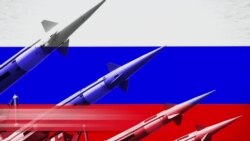On June 26, Russia’s Foreign Ministry spokeswoman accused U.K. authorities of using “nonexistent” Russian nuclear threats to distract British citizens from domestic problems.
Mainstream Russian news outlets reported that Maria Zakharova wrote on Telegram:
“The British establishment does not get tired of preparing for a nuclear apocalypse, inventing nonexistent statements by Russia on that score.”
That is false. The U.K. has not fabricated Russian nuclear threats.
Instead, Russian officials regularly engage in nuclear saber-rattling, including direct threats against the U.K. The talk comes from President Vladimir Putin on down.
On May 1, Dmitry Kiselyov, host of “Vesti Nedeli” (News of the Week), a prime-time political talk show on Rossiya-1 state TV, said Russia could wipe out the U.K. by sea and by air. He illustrated his threats with a video simulation of a Russian nuclear strike targeting U.K. and Ireland.
“Just one launch, Boris, and England is gone. Once and for all,” Kiselyov said. He was addressing Britain’s Prime Minister Boris Johnson, who had visited Kyiv a few weeks earlier in a gesture of solidarity with Ukraine against Russia’s military aggression, promising more military aid.
England and Ireland could be “plunged into the sea” and turned into a “radioactive wasteland” with a single Russian nuclear missile launched from a submarine, Kiselyov said.
Kiselyov’s talk show is watched by millions of Russians inside and outside the country.
Kiselyov is also a senior Putin-appointed government official, who is CEO of MIA Rossiya Segodnya, Russia’s state broadcasting media group, overseeing 32 news sites and TV channels. They include RT (formerly Russia Today), Sputnik, RIA Novosti, Ukraine.ru, The Arctic, Baltnews and InoSMI.
Various Russian lawmakers have made similar statements since Putin ordered troops into Ukraine on February 24.
On June 24, Andrey Gurulyov, a lawmaker in the State Duma, the lower house of Russia’s parliament, and a former deputy commander of Russia’s southern military district, discussed plans for a Russian war with NATO in Europe that would involve the use of nuclear weapons. “The first to be hit will be London. Without doubt the threat to the world comes from the Anglo-Saxons,” Gurulyov said.
On April 28, Aleksey Zhuravlyov, a Duma deputy and leader of the Russian nationalist political party Rodina (Motherland), said on national TV that “one Sarmat missile and the British Isles will be no more.” He then discussed with the program’s host how many seconds it would take for Russian nuclear missiles to wipe out European capitals, starting with London, which they said would be destroyed in 200 seconds.
Russia’s Sarmat intercontinental ballistic missile is capable of carrying multiple warheads and believed to be “hard to intercept.” According to Military Today, a single Sarmat missile could “completely destroy three U.S. states, such as Maryland, Vermont, and Rhode Island.”
Zhuravlyov repeated his nuclear threats in an interview with the British tabloid The Mirror on June 6. In it, he added the United States and Finland, which had just announced its intention to join NATO, to the Russian target list.
Finland would be wiped out in 10 seconds, and only “nuclear ashes” would remain after a Sarmat strike on the U.S., Zhuravlyov said.
Putin set the tone for these nuclear threats.
On February 27, three days after launching the invasion of Ukraine, and facing a strong and unified Western response, Putin ordered Russia’s nuclear forces be put on a “special regime of combat duty” – high alert.
The move, seen as an escalation, triggered public anxiety and fears of nuclear war worldwide.
NATO Secretary-General Jens Stoltenberg called Putin’s order “dangerous rhetoric” and “irresponsible behavior.”
U.S. President Joe Biden tried to ease tensions, saying that Americans should not be worried about Russia’s nuclear threats. A White House official later told Reuters that “a nuclear war cannot be won and must never be fought.”
But Putin’s February 27 nuclear order was not a stand-alone event. He has made nuclear threats before and since.
In fact, Putin has made so many such threats that on June 23, 65 countries that signed the United Nations Treaty on the Prohibition of Nuclear Weapons issued a joint declaration in Vienna, Austria, condemning Russian nuclear threats.
“In response to Russia’s nuclear threats and the increasing dangers of nuclear war, state parties to the Treaty on the Prohibition of Nuclear Weapons condemned unequivocally any and all nuclear threats, whether they be explicit or implicit and irrespective of the circumstances,” the document stated.
The declaration also created a new global alliance “to push back against unacceptable and illegal nuclear threats and risks of nuclear war.”
On June 17, a group of U.S. Republican congressmen called on the White House to deliver a “stronger response” to Russia’s threat of using nuclear weapons in Ukraine and beyond.
“The lawmakers specifically pointed to Russian President Vladimir Putin, who threatened ‘those who stand in our way,’ saying the ‘consequences will be such as you have never seen in your entire history’,” The Hill newspaper reported.






